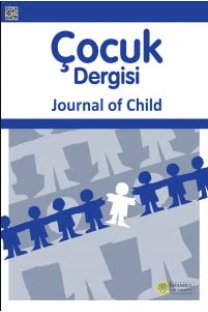Biyotinidaz eksikliği taraması ile belirlenen hastaların aile bireylerinde bulunan geç tanılı 31 hastanın değerlendirilmesi
Biyotinidaz, Yenidoğan taraması, Süt çocuğu, yenidoğan, Biyotinidaz eksikliği
Evaluation of 31 late diagnosed patients detected by family studies of biotinidase deficient patients
Biotinidase, Neonatal Screening, Infant, Newborn, Biotinidase Deficiency,
___
- 1. Pispa J. Animal biotinidase. Ann Med Exp Biol Fenn 1965; 43:1-39
- 2. Wolf B, Heard GS, McVoy JS, Raetz HM. Biotinidase deficiency: The possible role of biotinidase in the processing of dietary protein-bound biotin. J Inherit Metab Dis 1984; 7: 121.
- 3. Baumgartner ER, Suormala T. Biotine-responsive multipl carboxylase deficiency. In: Fernandez J, Saudubray JM, van den Berghe G, eds. Inborn Metabolic Diseases, 3rd ed. Berlin: Springer, 000: 277-82.
- 4. Wolf B, Grier RE, Allen RJ, Goodman SI, Kien CL. Biotinidase deficiency: The enzymatic defect in late-onset multipl carboxylase deficiency. Clin Chem Acta 1983; 131: 273-81
- 5. Wolf B. Worldwide survey of neonatal screening for biotinidase eficiency. J Inherit Metab Dis 1991; 14: 923-7.
- 6. Wolf B, Norrgard K, Pomponio RJ, Mock DM, McVoy JRS, et al. Profound biotinidase deficiency in two asymptomiatic adults. Am J Med Genet 1997; 73: 5-9.
- 7. Wolf B. Biotinidase deficiency: New directions and practical concerns. Curr Treat Options Neurol 2003; 5:321-8.
- 8. Wolf B. Children with profound biotinidase deficiency should be treated with biotin regardless of their residual enzyme activity or genotype. Eur J of Pediatric 2002; 161: 167-8.
- ISSN: 1302-9940
- Yayın Aralığı: Yılda 4 Sayı
- Başlangıç: 2000
- Yayıncı: İstanbul Üniversitesi
Çocuklarda obezite sorunu ve önlemler
LÜTFİYE HİLAL ÖZCEBE, Sabahat TEZCAN, Pınar GÜNER
Çocukluk çağı servikofasiyal lenf nodu büyümeleri
Funda ÇORAPÇIOĞLU, Nazan SARPER, Ebru ÖNAY
Çocuklarda tekrarlayan pnömonilere yaklaşım
Zeynep TAMAY, Ahmet AKÇAY, Ülker ÖNEŞ
Bir Trizomi 18 (Edward's Sendromu) vakası
Rıdvan DURAN, Ülfet VATANSEVER, Aylin ŞİMŞEK, Nermin TUNÇBİLEK, Betül ACUNAŞ
Akut hepatit A vakaları ve ekstrahepatik komplikasyonlar
Olcay YASA, Fatma DURSUN, Atiye FEDAKAR, Müferet ERGÜVEN
Solid tümörlü çocuklarda eritropoetin tedavisi
Tavukçu Fatma ERGİN, Gülnur TOKUÇ, Sedat ÖKTEM, Perran BORAN, Özlem KETENCİ
Bir Trizomi 18 (Edward's Sendromu) vakası
Nermin TUNÇBİLEK, Betül ACUNAŞ, Ülfet VATANSEVER, Rıdvan DURAN, Aylin ŞİMŞEK
Özlem ALTAY, Emin ÜNÜVAR, Fatih AYDIN, Fatma OĞUZ, Müjgan SIDAL
